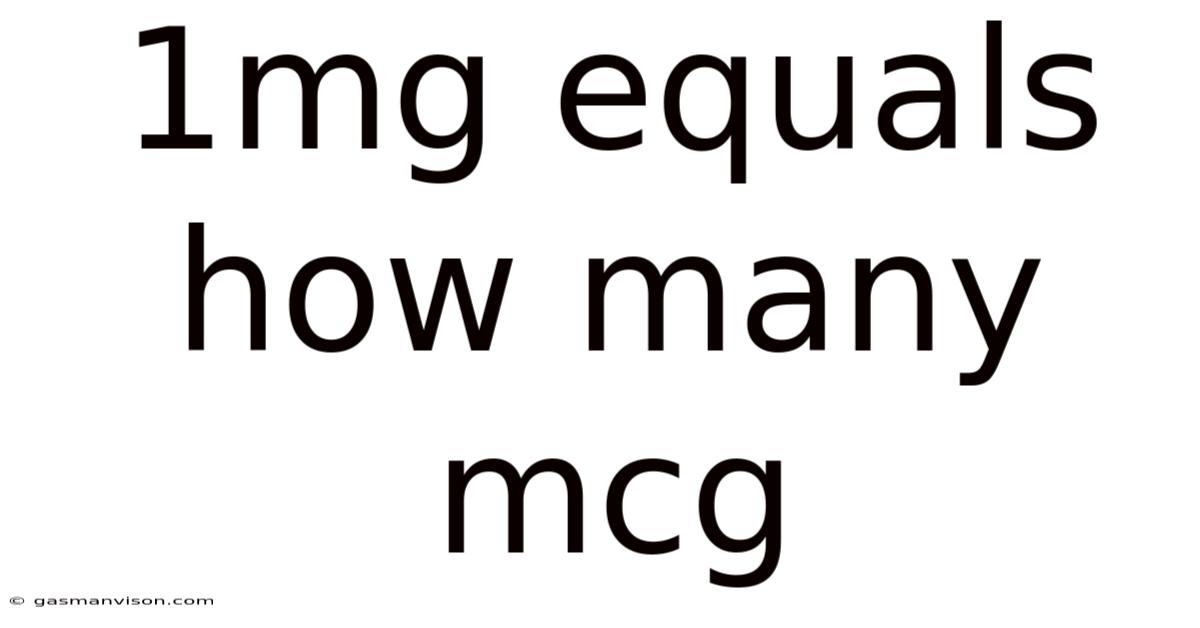1mg Equals How Many Mcg
gasmanvison
Sep 16, 2025 · 4 min read

Table of Contents
1mg Equals How Many mcg? A Comprehensive Guide to Metric Conversions
Understanding metric conversions is crucial in various fields, from medicine and pharmaceuticals to cooking and scientific research. One common conversion that often causes confusion is the relationship between milligrams (mg) and micrograms (mcg). This comprehensive guide will clarify the conversion, provide practical examples, and delve into the importance of accurate conversions in different contexts. Knowing that 1 mg equals 1000 mcg is the fundamental knowledge, but let's explore the "why" and "how" in detail.
Understanding Milligrams and Micrograms
Before jumping into the conversion, let's define the units:
-
Milligram (mg): A milligram is a unit of mass in the metric system. The "milli" prefix means one-thousandth (1/1000). Therefore, one milligram is one-thousandth of a gram.
-
Microgram (mcg or µg): A microgram is also a unit of mass in the metric system. The "micro" prefix means one-millionth (1/1,000,000). This means one microgram is one-millionth of a gram.
The Conversion: 1mg to mcg
The core conversion is straightforward: 1 milligram (mg) is equal to 1000 micrograms (mcg). This is because there are 1000 milligrams in one gram, and 1,000,000 micrograms in one gram. The relationship can be visualized as follows:
1 gram (g) = 1000 milligrams (mg) 1 gram (g) = 1,000,000 micrograms (mcg)
Therefore, if 1000 mg = 1,000,000 mcg, then 1 mg = 1000 mcg.
Why Accurate Conversion is Crucial
Precise conversions are paramount in several scenarios:
-
Pharmaceuticals and Medicine: In medicine, dosages are often measured in milligrams or micrograms. Incorrect conversions can lead to serious consequences, ranging from ineffective treatment to overdose. For instance, medications for children often require microgram precision. A wrong conversion could result in a child receiving either too little or too much medication, impacting their health and recovery.
-
Scientific Research: Many scientific experiments and analyses require precise measurements of mass, especially in fields like chemistry, biology, and materials science. Accurate conversions are essential for replicating results and ensuring the reliability of research findings. Errors in measurement can lead to inaccurate conclusions and flawed research.
-
Food Science and Nutrition: Nutritional information on food labels often lists the amount of certain vitamins and minerals in milligrams or micrograms. Accurate conversions are important for understanding the nutritional content of food and planning a healthy diet.
-
Environmental Science: In environmental monitoring and analysis, extremely small quantities of pollutants or contaminants are measured in micrograms per liter or cubic meter. Accurate conversions are crucial for assessing environmental risks and implementing appropriate mitigation strategies.
-
Industrial Processes: Many industrial processes require precise measurements of materials and ingredients. Incorrect conversions can lead to production errors and waste.
Practical Examples of mg to mcg Conversion
Let's illustrate the conversion with a few examples:
-
Example 1: A medication contains 5 mg of an active ingredient. How many mcg is this?
Solution: 5 mg * 1000 mcg/mg = 5000 mcg
-
Example 2: A laboratory analysis reveals 250 mcg of a substance. How many mg is this?
Solution: 250 mcg / 1000 mcg/mg = 0.25 mg
-
Example 3: A recipe calls for 0.75 mg of a spice. What is the equivalent in mcg?
Solution: 0.75 mg * 1000 mcg/mg = 750 mcg
-
Example 4: A blood test shows a hormone level of 1250 mcg/dL. Express this in mg/dL.
Solution: 1250 mcg/dL / 1000 mcg/mg = 1.25 mg/dL
Common Mistakes to Avoid
Several common mistakes can occur when converting between mg and mcg:
-
Misplacing the decimal point: This is a frequent error, especially when dealing with small numbers. Double-checking your calculations is crucial.
-
Using the wrong conversion factor: Remember, it's 1000 mcg per 1 mg, not the other way around.
-
Not considering the units: Always include the units (mg or mcg) in your calculations to avoid confusion.
-
Incorrect rounding: Depending on the context, rounding might be necessary. However, ensure you round appropriately to avoid significant errors.
Beyond the Basic Conversion: Working with Larger and Smaller Quantities
The basic conversion (1 mg = 1000 mcg) forms the foundation for handling larger or smaller quantities. For instance:
-
Converting grams to micrograms: First, convert grams to milligrams (multiply by 1000), then convert milligrams to micrograms (multiply by 1000 again). Therefore, 1 gram equals 1,000,000 micrograms.
-
Converting kilograms to micrograms: Convert kilograms to grams (multiply by 1000), then grams to milligrams (multiply by 1000), and finally milligrams to micrograms (multiply by 1000). Therefore, 1 kilogram equals 1,000,000,000 micrograms.
Using Online Conversion Tools
While understanding the conversion is vital, various online conversion tools can simplify the process. These tools can be particularly helpful when dealing with complex conversions or large numbers. However, always double-check the results with your own calculations, especially in critical applications like medicine and scientific research.
Conclusion
The conversion of milligrams to micrograms, and vice versa, is a fundamental aspect of metric system understanding. While the basic conversion—1 mg = 1000 mcg—is straightforward, accurate conversion is crucial for ensuring precision in various fields. Understanding the reasons behind accurate conversion, avoiding common mistakes, and utilizing appropriate tools can significantly enhance accuracy and minimize the risk of errors. Always prioritize precision when working with these units, particularly in applications where accuracy can have significant consequences.
Latest Posts
Latest Posts
-
Aaron Drew The Figure Below
Sep 16, 2025
-
Actual Dimensions Of A 2x3
Sep 16, 2025
-
300 Km How Many Miles
Sep 16, 2025
-
Hz To Rad Sec Converter
Sep 16, 2025
-
2y 3 5 1 2
Sep 16, 2025
Related Post
Thank you for visiting our website which covers about 1mg Equals How Many Mcg . We hope the information provided has been useful to you. Feel free to contact us if you have any questions or need further assistance. See you next time and don't miss to bookmark.